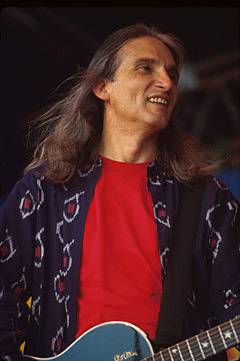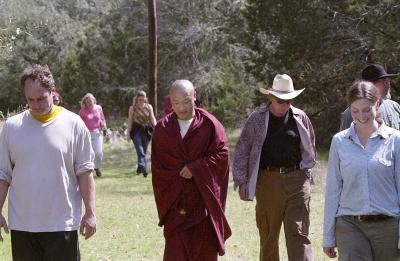
 Jimmie Dale Gilmore
Jimmie Dale Gilmore
Jimmie Dale Gilmore is a Texan country singer who spent many years in the 1970's as a premie of Guru Maharaj Ji apparently living in a Colorado ashram. As he knows, he was a very unusual premie: "In my practice with Maharaji, being a book person was not encouraged; it was even looked at as a distraction." Though it's taken a few decades Gilmore now has a serious spiritual practice: "I didn't have any real teaching; I wasn't actually studying with a master, because I had no personal contact with Maharaji." He feels no resentment though that might come if he thinks a little more seriously about a self-declared "Perfect Master" who claims to "reveal the Knowledge of God" and to be the only person alive who can reveal true "Inner Peace" and who can provide no real personal teaching and wallows in opulence at his students' expense.
But then, it would be out of character for the 51-year-old singer, whose marvelous fifth album, "Braver Newer World," has just been released on Elektra, to criticize anyone. Jo Carol Pierce, the first of Gilmore's three wives and an idiosyncratic -- not to mention outright randy -- Texas singer and songwriter in her own right, has said that Gilmore "really is a true sweetheart. I don't think that I've ever heard Jimmie say anything bad about anybody. … It's a kind of sweetness in the genes, I think. In 1974, after dropping out of college and going nowhere in local bands, Gilmore gave up music. For the next six years he lived in the Divine Light Mission in Colorado, where he was a disciple of the teenaged Guru Maharaj Ji."
His story is not unusual though he was a little older (born 1945) than most premies of Maharaji's (Prem Rawat):
I experienced a whole lot of confusion from the way my family was in the '60s. The disruption of all the institutions, plus drugs and everything else that played into that -- a dismantling of a worldview. I experienced it, there came a certain point, it was kind of like I've either got to understand better what's going on or I'm going to go crazy. I opted to go for studying Hindu philosophy and studying under a meditation teacher rather than pursuing a music career. My music career had already started at that point -- I was in my late 20s when we did the Flatlanders. So I was a late bloomer even in that respect. But when I came back and did my solo thing, that was many years later. Nearly all the '70s I was devoting myself to trying to find out what was going on.
A yin-yang hybrid of suffering and compassion runs through the Buddhist student's work - "I've seen crimson roses growing through a chain-link fence / I've seen crystal visions, sometimes they don't make sense," he sings in "Where You Going." A stint with the guru Maharaj Ji during the 1970s saddled him with what he characterizes as a "somewhat misleading" reputation as an eastern mystic
Gilmore moved to New Orleans to immerse himself in the teachings of Maharaji, a 14-year old Indian who meditation techniques freed him to feel life instead of think about it, bringing him a joy more enduring than what he experienced in nightclubs. The ashram where he lived was just a few blocks from Tipitina's, mecca of the lively New Orleans music scene, but Gilmore had no interest in taking his guitar over there for a gig. He was surprised by how at peace he felt. "Not only am I a twentieth-century American, I am a West Texan," Gilmore said in a 1995 interview with the Buddhist publication Shambala Sun. "Bowing down to anything was absolute taboo in the culture I was raised in. That was so taboo it wasn't even thought of as a possibility. To me, the bowing down was an act of surrendering the ego. I didn't think I could do that. And then I did it. It was very liberating." Within a few years, Gilmore was living in Denver in a community of several thousand Maharaji followers. He helped coordinate music for the Divine Light Mission, and occasionally he sat in with his Lubbock friends, Tommy and Charlene Hancock, also Maharaji followers, performed in clubs around town. But for years, Gilmore steered clear of the music business. He became interested in Oriental medicine while working at a health food store. He started commuting to Boulder for acupuncture classes. He also became curious enough about macrobiotics to study in Boston at Michio Kushi's renowned institute. Then Gilmore reached a crossroads. "I had to decide whether to move to Boulder to continue with acupuncture studies or to Austin to resume my music career," he recalls. "It finally became clear to me how much I loved music. I decided that I could read books about Oriental medicine and study that stuff as a hobby."
Gilmore returned to playing music but without a strong grounding in meditation and spiritual practice he soon went off the rails.
In the early '80s Gilmore found himself in Austin playing five nights a week, on-stage and off. "I went completely crazy," he remembers. "I was drinking all the time. And I was being devotedly not monogamous." Having already had two failed marriages, Gilmore was determined to avoid entanglements. What he didn't quite grasp was that relationships were just what he was missing. "I was not longer surrounded by the community I'd had in Denver," he says, "so I didn't have the ongoing support and inspiration. I let my meditation practice taper off. I became very unhappy."
For someone who read far more widely (reading and studying other spiritual practices and concepts was strongly disapproved of in Rawat's followers) than most of Rawat's premies, it still took Gilmore many years to realize that Rawat "taught" simplistic meditation techniques and didn't give the indepth help that someone who actually practised meditation and was involved face to face could give.
Whatever subliminal spirituality may have imbued his boyhood home, Gilmore declares that his first bona fide religious influence was MAD magazine. When he was in his early teens, be would wait for each month's issue with feverish anticipation. "I was a total MAD magazine addict. It was religious in the intensity of emotion I felt reading it, but more than that, it was the iconoclasm of the magazine, the not-taking-the-status-quo-for-granted that struck me as deeply moral. The passion for music and for MAD magazine were my first inklings of a spiritual life, that there was some internal state that was mysterious and nor easy to access." On the heels of that obsession, Gilmore became an insatiable reader of philosophy: the transcendentalists, the Beats, Aldous Huxley, Buckminster Fuller, Wirtgenstein, transpersonal psychology, all poured into his head. In college at Texas Tech (where his father had run the dairy sciences department), one of Gilmore's professors had studied under Bertrand Russell. The pieces were starting to come together.
As far removed as Lubbock may have been from the centers of 1960s spiritual experimentation like San Francisco and New York, its children still caught the wave of their generation. In the early '70s, along with thousands of other Americans, Gilmore learned about the teenage spiritual master Maharaji Prem Rawat. From the platform of his readings, he began studying meditation and Hindu Vedanta philosophy, and became such an avid disciple that Lubbock—and Texas—could no longer hold him. Not long after the Flatlanders cut that first record in Nashville, Gilmore moved to Denver to be part of a Maharaji community that had sprouted there. During the Denver years, Gilmore's fourth child, Cohn, was born to his second wife, Debby Fields. Cohn is a singer and songwriter who sometimes tours with his father. (Gilmore's three older children were born in Lubbock to his first wife, singer Carol Jo Pierce.) Gilmore remained in Colorado for nearly a decade, practicing meditation, reading fanatically, and consciously avoiding the music business; but he played and wrote songs all the while. His marriage to Debby eventually ended also, but the two remain tight friends.
Gilmore muses that during the Maharaji years, religion was "more of a hobby than a serious spiritual pursuit. The way I perceive it now, I didn't have any real teaching; I wasn't actually studying with a master, because I had no personal contact with Maharaji. I still have a deep love for him, but totally at a distance. I'm disaffiliated, but I'm not resentful. Far from it." While meditation is, of course, the cornerstone of Maharaji's teachings, there was no one to guide Gilmore across the plateaus. "I had always thought I was doing something wrong; not wrong in the sense of evil, but just incorrectly. I spent many, many, many years with a sort of low—level guilt about not meditating right. I thought that I wasn't achieving the objective, but I didn't realize I had barely gotten started" In 1981, Gilmore left Denver and Maharaji and moved to Austin, Texas.
Long term involvement with Prem Rawat usually involves the belief that the problem is with you, not the guru, who must always be lauded as the source of all that is good. Gilmore was not unusual in this respect. Rawat's Knowledge had not given him any real insight and experience but this finally began through Buddhism."
In the comings and goings of the Lubbock crew in Austin, Janet met Joe Ely's wife, Sharon Ely. They became good friends and began attending teachings at the Austin Shambhala Center. Jimmie would go along sometimes, but never took it to heart. He began reading more Buddhist literature, though: Nagarjuna, Shantideva, B. Allan Wallace, Robert Thurman, Joanna Macy's Mutual Causality in Buddhism and General Systems Theory. What for years had been an intellectual interest began to coalesce. "I had a breakdown, for lack of a better word. I was reading all this stuff, and it was like my bookish spiritual understanding collided with my underlying, hypocritical hedonism. I realized that I embodied all the traits I most disliked in other people. I could see that I had always gone around with a superior attitude, that I was extremely self-centered and didn't know it. In one sense, it was fantastic because I got the gift of the dharma. But coming to this realization wasn't very pleasant. I wouldn't wish it on anybody."
IN THE WAKE OF this realization, Gilmore's meditation changed. "Over the course of a few weeks, after the sort of crashing out happened, I saw that I had always gone around with a superior attitude and I could see that it was a mask for some very deep feelings of inferiority. But rather than demoralizing me, in the context of the Buddha's teachings, it just kindled a desire to do better, to become better. To practice being what I really wished to be. Up to that point, I had been a musician and a vagabond." The text that acted as a lightning rod for Gilmore was a quatrain from Shantideva's Guide to the Bodhisattva's Way of Life:
All the joy the world contains
Has come through wishing happiness for others.
All the misery the world contains
Has come through wanting pleasure for oneself.
Gilmore and the Flatlanders' "family" now study Buddhism under Tulku Thubten Rinpoche, a young Tibetan lama from the Nyingma lineage of the Kailua Shambhala Meditation Center though he formerly taught at the Vajrayana Foundation in Berkeley, California. Like most people who have been involved with Prem Rawat (Maharaji) they have learnt to move on - better late than never!
References: The information on this page was sourced from the following
PS. I bought my first Jimmie Dale Gilmore CD because I'd heard he'd been a premie and was curious. I bought the others because of the music.
